六年级英语语法练习题
小学六年级英语语法专练(含答案)
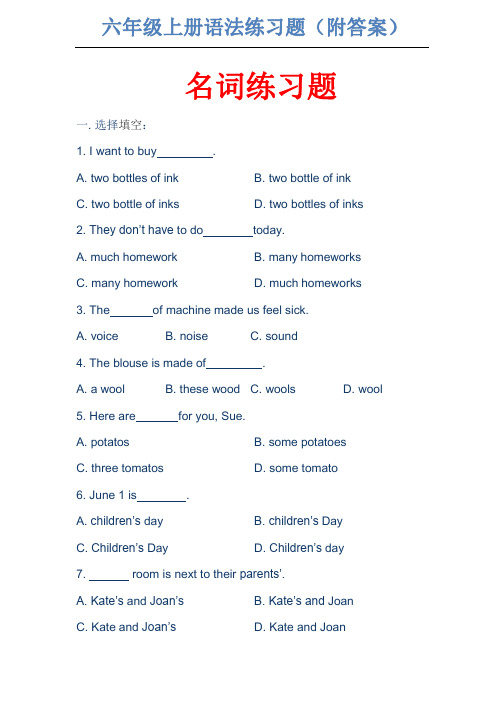
六年级上册语法练习题(附答案)名词练习题一. 选择填空:1. I want to buy .A. two bottles of inkB. two bottle of inkC. two bottle of inksD. two bottles of inks2. They don’t have to do today.A. much homeworkB. many homeworksC. many homeworkD. much homeworks3. The of machine made us feel sick.A. voiceB. noiseC. sound4. The blouse is made of .A. a woolB. these woodC. woolsD. wool5. Here are for you, Sue.A. potatosB. some potatoesC. three tomatosD. some tomato6. June 1 is .A. children’s dayB. children’s DayC. Children’s DayD. Children’s day7. room is next to their parents’.A. Kate’s and Joan’sB. Kate’s and JoanC. Kate and Joan’sD. Kate and Joan8. Miss Green is a friend of .A. Mary’s mother’sB. Mary’s motherC. Mary mother’sD. mother’s of Mary9. Tom is . He will come to see me.A. my a friendB. a friendC. mine friendD. a friend of mine10. Sheep white and milk also white.A. is, areB. are, isC. is, isD. are, are11. I’d like to have a glass of milk and .A. two breadsB. two pieces of breadsC. two pieces of breadD. two piece of bread12. It’s a long to Paris. It’s two thousand kilometers.A. streetB. roadC. wayD. end13. Many are singing over there.A. womanB. womenC. girlD. child14. He bought .A. two pairs of shoesB. two pair of shoesC. two pairs of shoeD. two pair of shoe15. Mr. White has three .A. childB. childrenC. childsD. childrens16. Beijing is one of the biggest in the world.A. citysB. cityC. cityesD. cities17. --- Where’s Mr. White? --- He’s in .A. the room 202B. Room 202C. the Room 202D. room 20218. --- Whose room is this? --- It’s.A. Li MingB. Li Ming’sC. Li Mings19. Every morning Mr. Smith takes a to his office.A. 20 minutes’ walksB. 20 minute’s walkC. 20-minutes walkD. 20-minute walk20. ---Are these ? --- No, they aren’t.A. sheepB. sheeps冠词( )1. This is interesting book and I enjoy it.A. aB.anC.the( )2. Middle school students don't need to go to school on weekends. They can go to park for fun with their parents or friends.A. /; aB. a; aC. the; aD. a; / ( )3. Nick is 8¬year¬old boy, but he can write more than 2,000 words.A. /B. theC. aD. an( )4. Bill likes playing basketball, but he doesn't like playing piano.A. the; theB./; theC. the; /( )5. Don't you know girl under the tree? She's our teacher's daughter.A. aB.anC. the( )6. new bridge has been built overChangjiang River in Huangshi.A. The; aB.A; theC.A; /D. An; the ( )7.—Do you know inventor?—Yes, he's friend of mine.A.an; theB. a; aC. the; a( )8. Lisa had egg and glass of milk for breakfast this morning.A. a; aB.an; anC. a; anD.an; a( )9. This summer, I'm going to visit Great Wall.A. aB.anC. theD./( )10.—Is Mr. Franco honest and capable man?—Yes.A.aB.anC.the( )11. In order to find better job, she planned to learn a second foreign language.A.theB.aC.an( )12. My mother is English teacher in a university in Beijing.A.aB.anC.theD./( )13.—What do you usually have for breakfast, Peter?—A fried egg, three pieces of bread and a glass of milk.A.aB.anC.theD./( )14. It's not good idea to drive for four hours.A.aB.anC.the( )15.—What does Michael look like?—He has big eyes and wide mouth.A.aB.anC.the( )16.—What do you want to be in the future, Nick?—I want to be pilot.It is exciting job.A.a; aB.a; anC.the; anD.a; the( )17. As we know, England is European country and Singapore is Asian country.A.an; anB.an; aC.a; aD.a; an( )18. Look!There is cat in the tree.A.aB.anC.theD./( )19.——“Cindy, do you have e-mail address?I want to send you some photos.”-“Yes, I do. It's *****************.”A.aB.anC.the( )20. Students usually go to school on weekdays.A. /B.theC.a代词( )1.Mr.Wang is very friendly, and like him very much.A.weC.ourD.ours ( )2.—Excuse me, are these books ?—No, they are classmate's.A.his; heB.hers; hersC.your; mineD.yours; my ( )3.—Is Miss White English teacher, Maria?—No, she teaches geography.A.your; myB.you; mineC.you; usD.your; us ( )4. Are there any differences between your idea and?A.heB.hisC.sheD.her ( )lie gave a baby cat yesterday that hurtwhen it fell from a tree.A.me; itB.myself; itselfC.me; itselfD.myself; it ( )6.—Who is the best friend of at school?—I think Helen is.We often help each other.A.mineB.hisC.yoursD.hers ( )7.—Linda, help to some fruit.—Thank you.A.youB.yoursC.yourselfD.yourselves( )8.—The pet dog in your hand is very nice.Is it _ ?—Yes, but I'll give it to my friend, Lucy, as birthday present.A.you; herB.yours; herC.your; herD.you; hers ( )9.—How was your visit to the World Park in Beijing?—Wonderful! We enjoyed very much.A.itselfB.myselfC.yourselvesD.ourselves ( )10.—Excuse me, I want to have my watch fixed, but I can't finda repair shop.—I know e on, I'll show you.A.oneB.itC.someD.that( )11.My sister has two skirts.One is yellow, is black.A.otherB.anotherC.othersD.the other ( )12.Sam looks like his Dad.They are tall.A.eitherB.anyC.allD.both( )13.—Do you want tea or coffee?—.I really don't mind.A.NoneB.EitherC.NeitherD.All( )14.—Wow!You've got so many skirts.—But of them are in fashion now.A.allB.bothC.neitherD.none( )15.—What do you think of the two backpacks?—of them are very nice.A.EitherB.BothC.EachD.All( )16.I hope I can find for my son in the shop.A.good somethingB.something goodC.many thingD.good anything( )17.All of us find necessary to take exercise every day.A.thisB.thatC.itD.them ( )18.Things made by hand are usually more expensive than produced in factories.A.theseB.thisC.thatD.those ( )19. There is wrong with my computer. It doesn' t work now. I’ll buy a new one.A. nothing.B. something.C. everything.( )20.—Do you have anything important to say for yourself?—except sorry.A.SomethingB.NothingC.AnythingD.Everything介词( )1. Lady Gaga is famous her beautiful voice.A.asB.withC.for( )2.—Jenny, will you still be here this afternoon?—Yeah, I think I'll stay five. Then I'm leaving for dinner.A.atB.inC.until( )3. I think every student should go to school , but some of them are always late.A.by the timeB.on timeC.for a timeD.at times ( )4. Linda is not good at Chinese, but she passed the exam the help of her classmates.A.withB.underC.without( )5. World No Smoking Day is May 31.A.inB.onC.at( )6. The paper is made wood and the desk is also made wood.A.of; fromB.of; ofC.from; of( )7. Don't drive so fast! We must slow down when we drive the tunnel.A.pastB.acrossC.overD.through( )8. The two kids practice English joining the English club.A.byB.inC.onD.with( )9. Lucy and I are twins, but we're different eachother in many ways.A.forB.inC.ofD.from( )10. On the way the mountain village, we found the local houses different from ours.A.toB.byC.atD.on( )11.—Jack, is maths difficult to learn in high school?—Sure. No subject can be learned well hard work.A.withoutB.throughC.byD.with( )12. In some western countries shops are closedweekends.A.inB.toC.atD.with( )13.Look at the wall.There are some pictures it.A.inB.onC.toD.at( )14.We can see a playground the two tall buildings.A.betweenB.amongC.inD.to( )15.—What time do you usually get up in the morning?—six o'clock.A .On B.For C.In D.At( )16. Linda was born July 2, and my birthday is also that month.A.in; onB.in; atC.on; inD.on; at ( )17. Both my parents were born 1970.A.atB.inC.onD.to( )18.—When will the second class begin?—two minutes.A.ForB.AtC.InD.After( )19.—Is Jack good at basketball?—Yes. basketball he is also good at table tennis.A.E xceptB.BesidesC.ButD.Beside ( )20. I go to school bus every morning.A.inB.onC.atD.by形容词和副词( )1.—Which is , the sun, the moon or the earth?—Of course the moon is.A.smallB.smallerC.smallestD.the smallest ( )2.He has made progress this term than before.A.littleB.lessC.fewerD.much ( )3.“We must keep in the library.”The woman saidto me.A.quiet; quietlyB.quietly; quietlyC.quietly; quietD.quiet; quiet ( )4.I can't get anything on TV. There must be with it.A.wrong somethingB.wrong nothingC.something wrongD.nothing wrong( )5.Linda has received that she is unable to get a job.A.such little educationB.so little educationC.a such little educationD.a so little education( )6.Many students think foreign languages are science subjects.A.more difficult asB.less difficult thanC.much difficult thanD.so difficult as( )7. the temperature is, water turns into steam.A.The high; the fastB.Higher; fasterC.The more higher; the fasterD.The higher; the faster( )8.He eats food, so he is fat.A.much too; too muchB.much too; too manyC.too much; much tooD.too much; many too( )9.—Who is Ren Changxia?—A great policewoman.She always thought of othersthan herself.A.moreB.muchC.lessD.most( )10.Kate felt when she saw the lovely dress in theclothes shop.A.pleasedB.tiredC.wellD.good( )11.Do not use so much water.It's .A.healthyefulC.wastefulD.rude( )12.Knowledge is money.But I think it is money.A.as important asB.so important asC.more important thanD.the same as( )13.—I think our chemistry teacher is working hard. He teaches us .—Yes, but he hasn't come today.He doesn't feel .A.good; wellB.good; goodC.well; goodD.well; well( )14. I read, I'll be.A.The much; the happyB.More; happierC.The more; the happierD.The most; the happiest( )15.I found he looked than last time when I went to see him.A.betterB.wellC.goodD.worrying( )16.The mother looked because her son hadn't been back.A.worryB.worriedC.to worryD.worrying ( )17.This sweater doesn't suit me.It's a bit small.Could you giveme one?A.a largeB.a largerC.the largestD.a smaller ( )18.—You have got the same shirt as I.—Yes.Mine is , but not so as yours.A.better; expensiveB.better; more expensiveC.more better; expensiveD.good; more expensive( )19.—Do you think the fish tastes ?—She cooked it , I think.A.good; goodB.well; goodC.well; wellD.good; well ( )20.—What's the matter with you?—I'm .I want some water to drink.A.thirstyB.hungryC.tiredD.sleep数词( )1. The volunteers sent books to a mountain village school on Children's Day.A.two hundreds ofB.two hundred ofC.two hundredsD.two hundred( )2.It is reported that people throw plastic bags along this street every day.A.hundredB.hundredsC.hundred ofD.hundreds of ( )3. What a surprise! It's time I've met the beautiful girl this week.A.threeB.thirdC.the threeD.the third ( )4. The teacher said that of the boys would take partin the talent show.A.three fiveB.three fivesC.thirds fifthsD.three fifths ( )5. About of the students in Grade N ine this year were born in the .A.three five; 1996B.three fifths; 1990sC.third fifth; 1997D.third fifths; 1990s( )6. of his works were written in his .A.One third; fiftiesB.One third; fiftyC.One thirds; fifties( )7. Our school is so famous that people come andvisit it every term.A.hundredB.hundredsC.hundred ofD.hundreds of ( )8. The action film has attracted millions of youngpeople to the cinema.A.130-minuteB.130-minutesC.130 minuteD.130 minutes ( )9. There are over students in their school.A.hundredsB.nine hundredsC.nine hundred( )10.—Jackie Chan has donated dollars to charity.—He is an example to us all.A.thousandB.thousandsC.thousand ofD.thousands of ( )11. Now, everybody, please turn to Page and look atthe picture.A.F ifth; fiveB.Five; fifthC.Fifth; fifthD.Five; five ( )12. My uncle bought me an iPhone for my birthday.A.twelveB.twelfthC.the twelveD.the twelfth ( )13. For breakfast, I usually have and two pieces of bread.A.a cup of milk halfB.half a cup of milkC.a half milk cupD.half a milk cup( )14.—How old is your daughter?—.We had a special party for her birthday last Sunday.A.Nine; nineB.Nine; ninthC.Ninth; nineD.Ninth; ninth( )15. Tom has just finished writing a article.A.nine-hundred-wordsB.nine-hundreds-wordC.nine-hundred-wordD.nine-hundreds-words( )16. I don't believe that this boy can paint such a nice picture.A.five years oldB.five-years-oldC.five-year-old( )17.—Excuse me, how can I get to the museum?—Sorry.It's my time to be here.A.oneB.firstC.once( )18.—Excuse me, where can I buy a jacket?—You can go to the Men's Wear Section on the floor.A.twoB.twiceC.second非谓语动词( )1. The group found it hard the job in time.A.finishingB.finishedC.to finishD.finish( )2.Why don't you let me now?A.to goB.goC.goingD.gone( )3.It's raining heavily.You'd better now.A.don't goB.don't to goC.not leaveD.not to leave ( )4.I'm allowed on Saturday.A.go to the moviesB.going to the moviesC.went to the moviesD.to go to the movies( )5.We mix the water and flour bread.A.to makeB.makingC.makeD.makes ( )6.Linda would rather than stay here.A.leftB.to leaveC.leavingD.leave ( )7.Did you watch the actor the whole play yesterday?A.performingB.to performC.performD.performed ( )8.They would really like you them.A.joinB.should joinC.to joinD.will join ( )9.There are so many kinds of MP4 in the shop.I can't decide .A.what to buyB.to buy whatC.which to buyD.to buy which ( )10.We decided our holiday in that town.A.not to spendB.not spendC.not spendingD.don't spend( )11.Lily hopes in France.A.studyB.studiesC.studyingD.to study ( )12.Some people find it easy the truth.A.to knowB.to knowingC.knowingD.know ( )13.We want the tour as soon as poss ible.A.startingB.startedC.startsD.to start ( )14.My mom had me _ a bottle of oil for her.A.to buyB.buyC.buyingD.buys ( )15.The teacher often encourages us hard.A.studyingB.studyC.studiesD.to study ( )16.The baby was made by this naughty brother.A.cryingB.cryC.to cryD. cries ( )17.It took Janet three hours reading this interesting story.A.to finishB.finishedC.finishingD.finish ( )18.My family invite you next Friday for the party.eB.to comeingD.came ( )19.It's so hot! Let's stop .A.has a glass of waterB.having a restC.to have a glass of waterD.have a rest情态动词1. Y ou stop when the traffic light turns red.A. canB. had betterC. needD. must2. — Mum, must I stay there the whole day?—No, you . You come back afterlunch, if you like.A. mustn't; canB. needn't; mustC. needn't; may3. “Whose notebook is this?”“It Jim’s. It has his name on it.”A. can’t beB. must beC. can be4. There's enough time for you to go to the airport. You hurry now.A. shouldB. needn'tC. mustD. can't5. —Mum, must I wash the dishes right now?—No, you .A. shouldn’tB. wouldn’tC. mustn’tD. needn’t6. —Is that your teacher?—That be Mr.Wang. He has gone to Japan with his wife.A. can’tB. mustn’tC. may not7.—Must I do my homework now, Mum?—. You can do it tomorrow.A. No, you needn’tB. No, you mustn’tC. Yes, you needD. Yes, you must8. ——You can hardly swim,you?——.But my mother says she’ll teach me during my summer holiday.A.can’t;No B.can;No C.can’t;Yes D.can;Yes9. —Is that your teacher?—That be Mr.Wang. He has gone to Japan with his wife.A. can’tB. mustn’tC. may not10. —Is that girl under the tree Mary?—No, that be Mary. She has gone to New York.A. canB. mustn’tC. can’t11.—Is Maria knocking at the door?—It be her. She has gone to Australia.A.may notB.needn'tC.mustn'tD.can't12. — Must I take a taxi?— No, you . It’s not far from here.A. can’tB. mustn’tC. shouldn’tD. needn’t13. -You be happy with the strong public support you‘ve received.-Yes,you’re right.I‘m really excited.A.mayB.canC.mustD.need14. Tom, you play with the knife.You hurt yourself.A. won't; can'tB. mustn't; mayC. should; mustD. can't; should15. I am not sure,he be in the classroom.A.may B.must C.can答案名词1-5 AABDB 6-10 CCADB 11-15 CCBAB 16-20 DBBDA 冠词1-5BADBC6-10BCDCB11-15BBDAA16-20BDABA 代词1-5ADDB C6-10CCBDA11-15DDBDB16-20BCD BB 介词6-10CDADA11-15AC BAC16-20CBCB D 1-5CCBAB形容词副词1-5DBACB6-10B DCAA11-15CCDCA16-20BBADA 数词1-5DDDD B6-10ADA CD11-15BBBBC16-18CBC非谓语动词1-5CBCDA6-10DCCCA11-15DA D BD16-20CABCD 情态动词1-5DC BBD6-10AA B A C11-15DDC B A。
小学六年级英语语法基础练习题
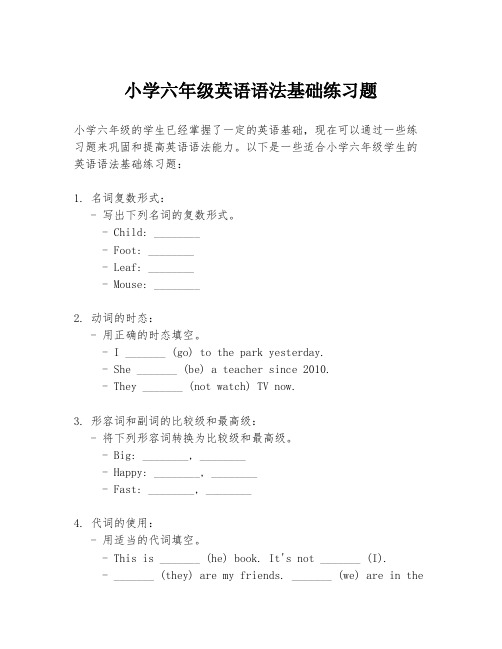
小学六年级英语语法基础练习题小学六年级的学生已经掌握了一定的英语基础,现在可以通过一些练习题来巩固和提高英语语法能力。
以下是一些适合小学六年级学生的英语语法基础练习题:1. 名词复数形式:- 写出下列名词的复数形式。
- Child: ________- Foot: ________- Leaf: ________- Mouse: ________2. 动词的时态:- 用正确的时态填空。
- I _______ (go) to the park yesterday.- She _______ (be) a teacher since 2010.- They _______ (not watch) TV now.3. 形容词和副词的比较级和最高级:- 将下列形容词转换为比较级和最高级。
- Big: ________, ________- Happy: ________, ________- Fast: ________, ________4. 代词的使用:- 用适当的代词填空。
- This is _______ (he) book. It's not _______ (I).- _______ (they) are my friends. _______ (we) are in thesame class.5. 介词的使用:- 用适当的介词填空。
- The cat is _______ the box.- The children are _______ the playground.- The books are _______ the shelf.6. 连词的使用:- 用适当的连词填空。
- I will go to the store, _______ I need to buy some milk.- She can play the piano, _______ she can also sing.7. 疑问句的构成:- 将下列陈述句转换为一般疑问句,并给出肯定和否定回答。
英语六年级语法练习题

英语六年级语法练习题1. 选择正确的动词形式填空。
1) She (go / goes) to school every day.2) My mother (cook / cooks) dinner in the evening.3) We (watch / watches) TV on Sundays.4) The cat (jump / jumps) over the fence.5) They (play / plays) basketball after school.2. 选择合适的形容词填空。
1) The cake is (delicious / deliciously).2) The girl is (beautiful / beautifully).3) The flowers smell (sweet / sweetly).4) The painting looks (amazing / amazingly).5) The music sounds (good / well).3. 选择正确的副词填空。
1) My brother can swim (fast / fastly).2) She writes (neatly / neat).3) They played tennis (good / well).4) He speaks English (fluently / fluent).5) The dog barks (loudly / loud).4. 选择正确的连词填空。
1) I want to go to the park, (but / and) it's raining outside.2) He is smart (so / because) he studies hard.3) She likes to read novels, (or / but) she doesn't like mysteries.4) I prefer tea (than / to) coffee.5) We can go swimming (if / while) the weather is nice.5. 选择正确的疑问词填空。
六年级英语语法练习题
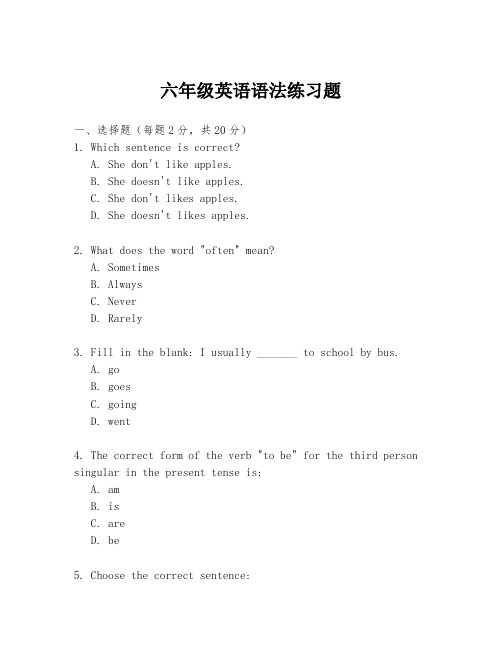
六年级英语语法练习题一、选择题(每题2分,共20分)1. Which sentence is correct?A. She don't like apples.B. She doesn't like apples.C. She don't likes apples.D. She doesn't likes apples.2. What does the word "often" mean?A. SometimesB. AlwaysC. NeverD. Rarely3. Fill in the blank: I usually _______ to school by bus.A. goB. goesC. goingD. went4. The correct form of the verb "to be" for the third person singular in the present tense is:A. amB. isC. areD. be5. Choose the correct sentence:A. They are playing soccer.B. They plays soccer.C. They are played soccer.D. They are playing the soccer.6. What is the past tense of "do"?A. didB. doC. doesD. don't7. Fill in the blank: She _______ her homework every day.A. doB. doesC. didD. don't8. The word "yesterday" is used to talk about:A. The pastB. The futureC. The presentD. The day after tomorrow9. Choose the correct sentence:A. I am reading a book.B. I reading a book.C. I reads a book.D. I readed a book.10. Fill in the blank: They _______ their homework last night.A. doB. didC. doesD. don't二、填空题(每题2分,共20分)11. My mother _______ (make) dinner every evening.12. The children _______ (be) excited about the school trip.13. We _______ (go) to the park last weekend.14. She _______ (not like) broccoli.15. They _______ (have) a big family.16. I _______ (watch) TV every night.17. He _______ (study) for his test tomorrow.18. We _______ (visit) my grandparents next weekend.19. She _______ (not want) to go to the party.20. The cat _______ (sleep) under the table.三、改错题(每题2分,共20分)21. She don't like to play basketball. _______22. They are play soccer in the park. _______23. I am go to the store later. _______24. He don't know the answer. _______25. We are play computer games last night. _______26. She is watch TV right now. _______27. They are not have any homework today. _______28. He am going to the library. _______29. I are reading a book. _______30. They was at the concert last night. _______四、翻译题(每题5分,共20分)31. 他每天下午踢足球。
六年级英语语法综合练习30题
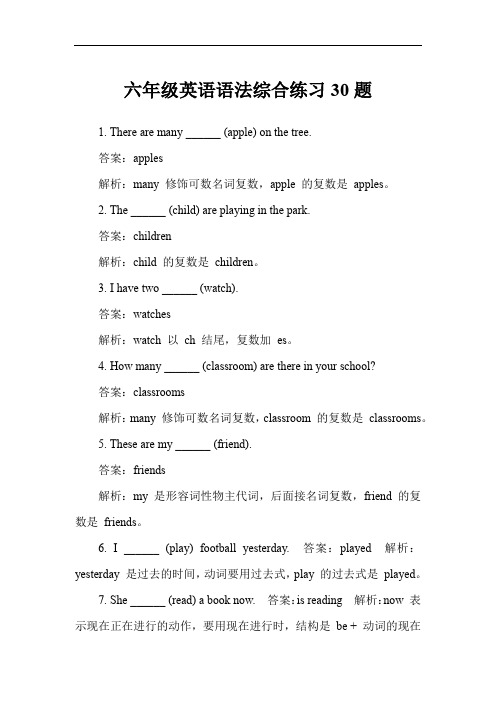
六年级英语语法综合练习30题1. There are many ______ (apple) on the tree.答案:apples解析:many 修饰可数名词复数,apple 的复数是apples。
2. The ______ (child) are playing in the park.答案:children解析:child 的复数是children。
3. I have two ______ (watch).答案:watches解析:watch 以ch 结尾,复数加es。
4. How many ______ (classroom) are there in your school?答案:classrooms解析:many 修饰可数名词复数,classroom 的复数是classrooms。
5. These are my ______ (friend).答案:friends解析:my 是形容词性物主代词,后面接名词复数,friend 的复数是friends。
6. I ______ (play) football yesterday. 答案:played 解析:yesterday 是过去的时间,动词要用过去式,play 的过去式是played。
7. She ______ (read) a book now. 答案:is reading 解析:now 表示现在正在进行的动作,要用现在进行时,结构是be + 动词的现在分词,read 的现在分词是reading,主语she 是第三人称单数,be 动词用is。
8. We ______ (have) a party next week. 答案:will have 解析:next week 是将来的时间,要用一般将来时,will + 动词原形。
9. They ______ (watch) TV every evening. 答案:watch 解析:every evening 是一般现在时的时间标志,主语they 是复数,动词用原形。
小学六年级英语语法练习题
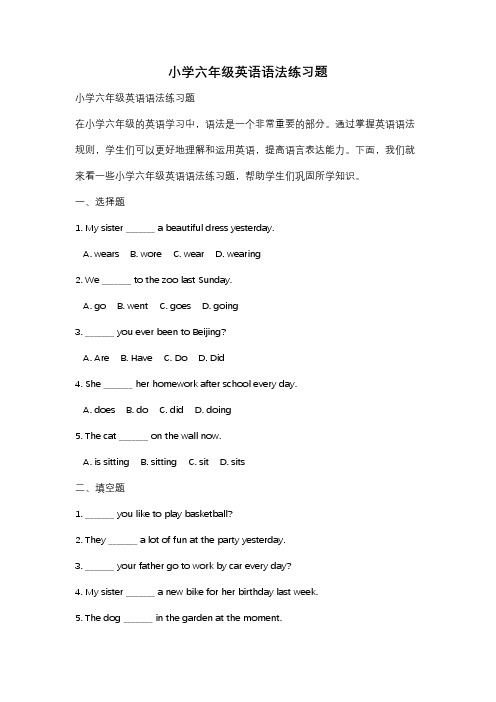
小学六年级英语语法练习题小学六年级英语语法练习题在小学六年级的英语学习中,语法是一个非常重要的部分。
通过掌握英语语法规则,学生们可以更好地理解和运用英语,提高语言表达能力。
下面,我们就来看一些小学六年级英语语法练习题,帮助学生们巩固所学知识。
一、选择题1. My sister _______ a beautiful dress yesterday.A. wearsB. woreC. wearD. wearing2. We _______ to the zoo last Sunday.A. goB. wentC. goesD. going3. _______ you ever been to Beijing?A. AreB. HaveC. DoD. Did4. She _______ her homework after school every day.A. doesB. doC. didD. doing5. The cat _______ on the wall now.A. is sittingB. sittingC. sitD. sits二、填空题1. _______ you like to play basketball?2. They _______ a lot of fun at the party yesterday.3. _______ your father go to work by car every day?4. My sister _______ a new bike for her birthday last week.5. The dog _______ in the garden at the moment.三、改错题1. I goed to the park with my friends yesterday.2. She don't have any brothers or sisters.3. Did you see the movie last night?4. We is going to the beach tomorrow.5. He buyed a new book from the bookstore.四、连词成句1. to, the, yesterday, zoo, went, we2. you, ever, to, been, have, London3. homework, always, after, does, she, school, do, her4. are, sitting, on, the, they, grass5. birthday, bike, a, new, for, got, she, her以上是一些小学六年级英语语法练习题,通过做这些题目,学生们可以巩固所学的语法知识,提高语言运用能力。
六年级语法练习题及答案

六年级语法练习题及答案第一节:单项选择题1. --- ________ does your father go to work?--- He goes to work by bus.A. HowB. WhereC. WhatD. When2. I often help my mother ________ the housework on weekends.A. doB. doesC. doingD. did3. Tom’s father is a doctor, ________ his mother is a teacher.A. butB. soC. andD. or4. The garden is beautiful. The flowers ________.A. are smellB. are smelledC. smellD. smelled5. Linda ________ to the park every Sunday with her friends.A. goesB. wentC. is goingD. has gone6. The students ________ English in the morning every day.A. studyingB. studiesC. studyD. studied7. Lisa ________ her schoolbag in the classroom this morning.A. leftB. leavesC. is leavingD. had left8. ________ hard the boy is! He always gets the highest score.A. WhatB. What aC. HowD. How a9. There ________ any milk in the fridge. Could you buy some?A. isn’tB. aren’tC. wasn’tD. weren’t10. The baby ________ very loudly now. Please ask him to be quiet.A. criesB. is cryingC. criedD. cry第二节:完形填空题阅读下面的短文,根据短文内容,从每题所给的A、B、C、D四个选项中选出一个最佳选项。
(完整)六年级英语语法练习题

(完整)六年级英语语法练习题六年级英语语法练题第一部分:选择题(共20分)1. My brother and I ________ to school together every day.A. goesB. are goingC. goD. going2. She ________ a book on the table yesterday.A. putB. puttingC. putsD. putted3. They ________ a picnic if it doesn't rain tomorrow.A. will haveB. haveC. hadD. has4. Sarah ________ to the park yesterday evening.A. goesB. goC. wentD. gone5. The cat ________ milk every morning.A. drinkB. drankC. drinksD. is drinking...第二部分:填空题(共30分)1. ___________ are my brothers.2. I had a great time ___________ my friends at the party.3. He will go to the supermarket _________ buy some groceries....第三部分:简答题(共50分)1. What are the three basic tenses in English?2. Give an example of a sentence using the present continuous tense.3. Explain the difference between "there", "their", and "they're"....第四部分:阅读理解(共60分)阅读下面的短文,然后根据短文内容回答问题。
- 1、下载文档前请自行甄别文档内容的完整性,平台不提供额外的编辑、内容补充、找答案等附加服务。
- 2、"仅部分预览"的文档,不可在线预览部分如存在完整性等问题,可反馈申请退款(可完整预览的文档不适用该条件!)。
- 3、如文档侵犯您的权益,请联系客服反馈,我们会尽快为您处理(人工客服工作时间:9:00-18:30)。
(keep)4. Why have you kept me here for so long a time?(wait)5. Please come to our meeti ng if you _______ free tomorrow. (be)6. She _________ to the Great Wall several times. (go)7. In his letter, he said that he _________ us very much. (miss)8. The film _________ for n early fiftee n mi nu tes whe n I got to the cin ema. (be) 9. He said he became _________ in physics. (in terest) 10. This film is worth _________ . (see)11. He went to school in stead of ________ home. (go)12. In the old days it was difficult for the poor to _________ a job. ( find) 13. It's cold outside, so you'd better _________ your coat. (put on) 14. He is hun gry. Please give him someth ing ________ . (eat)15. Please don't waste time _________ TV every eve ning. You should word hard at En glish. (watch)16. We found the window _________ . (break)17. You have dropped your pencil. _________ .(拾起它) 18. Mother ofte n tells me _________ too late. (not come home)一 、写 出 下 列 2.单 词 的 mango复1. book 3. sheep 4.radio5. yo-yo6.kn ife7. child 8.man9. Walkma n 10.tooth、写出下列数词的基数词或序数词。
(5%)1. one2.two3. three4.five5. nine6.twe nty7. eighty-eight 8.twen ty-first9. ten th 10nin ety-sixth三、 写下列单词的宾格或主格。
(3%)1. I2.she3. we4.us5. him6.them四、 写出下列单词的形容词物主代词和名词性物主代词。
(7%)1. I2.you3. he4.she5. it6.we7.they数4.I help you with some shoes, madam?—Yes, I would like to try on those brow n on es.A. WillB. ShouldC. MayD. Must1. He _________ back a month ago. (come)2. My mother ofte n tells me ________ in bed. (n ot read)3. I must take it back the day after tomorrow. You can only it for 24 hours.19. You had better _________ b y bus, or you will be late. (go) 20. I will _________ Li Ming the good n ews as soon as I see him.( tell) 21. Great cha nges _________ i n our country since 1978. (take place) 22.1 __________ my daughter since last mon th. (hear from) 23. It _________ me two days to write the article. (took) 24. Don't touch that _________ c hild. (sleep)25. Every time he tried to start the car, the wheels _________ deeper into the mud. (si nk) 26. When I got home, I found that my room ______________ break into and a lot of things __________ . (steal)27. If I had arrived there earlier, I _________him. (meet) 28. I did n't remember _________ h er the book before. (give)29. He called at every door, _________ people the excit ing n ews. (tell)30. Yesterday Mary could n't finish her homework, so she has to go on ________ it this after noon. (do)you like some milk ? A . Would B. Could _pick the flower in the park. A. can ' t B. don't( )3.W e should ______ more trees, and we shouldnA. pla ntB. pla nti ngC. pla nts( )4.May I have some coffee?A. Yes, you have.B. Yes, you can.C. Yes, certainly.( )5.Shall we visit the factory?A. Yes, we do.B. Yes, we shall. B. All right.( )6.Would you like somethi ng to eat?A. Yes, we would.B. Yes, 'like some cakes.C. Yes, of course. ()7.What can I do for you?A. Yes, you can.B. No, I can do it.C. Yes. Id like some oranges.(二)按要求改写句子。
1. I can run fast.I _______________ fast.(否定句)2. You must return the book now.(一般疑问句)_______ I the book now? No, you ________ . 3.He can play basketball well.(一般疑问句)hebasketball well?4. They must take the books out of the room. (否定句)They _______________ the books out of the room.5. He should get up early.(否定句) He _______ g et up late. ()1.They ____ climb ing mountains.A. likeB. likesC. liki ng ()2.Tom and Jacksome readi ng every day.A. doB.doesC. doing()3.My brother hard.A. studyB. studysC. studies( )4.Joe does n 'tany money now.()1.—()2. WeC . Can C. must n 't t cut any trees.A. haveB. has )5.Tom 'E nglish teacher ____ him questi ons very ofte n. A. ask B. asks )6.Mary and May ____ e xercise un der the tree now. A. take B. are tak ing )7.1 am going to ____ a soldier 10 years later. A. walks B. walk ing )8.1 will ___ very cold tomorrow.A. beB. is)9.Mike ofte n ___ exercise on Thursday after noon. A. takes B. is talki ngC. is going to take)10.Be n _____ a lot of cold water just now.( ( ( ( ( ( C. hav ing C. ask ing C. tak ing C. walkC. going to beA. drinksB. drinkedC. drank()11.We can _________ differe nt ani mals in the zoo.A. seeB. sawC. seei ng()12. The train ___________at about 10:00 last night. A. leaves B. leavi ng C. left( )13.She will __________ water the flower later.A. waterB. watersC. wateri ng( )14. Ken _________ t he Night Zoo by bus next Su nday.A . is goi ng to visitB. visitsC. visit ing()15.Look, the childre n _____ in the park.A. are havi ng funB. is havi ng funC. are going to have fun()16、Mr. Brown _______ tomorrow.A . goes fish ing B. will go fish ing C. go fish ing()17. ______ t he childre n visit ing the museum now?A. AreB. DoC. Can( )18. When does your classes _____ ?A. startB. startsC. ope n ( )19.How _ your brother ____________ to work last Sun day?A. does , goB. did , goC. did , went ()20. My pare nts _____ lunch at 12:00.A . haveB. hasC .with、写出下列名词的复数1、building 4、family 7、toilet 10.woma n2、office 5、 hand & baby 11.k nife3、library 6、box 9、class 12.ma ngo1、 The (boy) are readi ng .2、How many(ma ngo) are there in thebasket? 3、Are there any (child) in the library? 4、Look, there is a i(library) over there.、用所给单词的适当形式填空5、 Can you put these ______ (book) on your head?6、 Do you like _______ (dog)?小学英语六年级时态练习 用所给词的正确形式填空1. -What _________ Su Hai _________ last Sun day? (do) -She ________ (go) for a walk.2. -Did you go _________ (swim) last Saturday? -No. We _______ (watch) a film.3. -What _________ Wang Bing usually _________ after school? (do) -He usually ________ (go) home and __________ (teach) his little brother.4. - ______ (be) Miss Li in the teachers ' office now?-No. She ' s__________ (take) photos. 5. -What 's the weather like?-It ' s _________ . It has a lot_o_f _______ here. (rain)6. _________ some water in the glass. _________ a lot of people in the garden. _________ a teacher and some students in the classroom. (there be)7. Helen _________ (like) ________ (draw) horses. She is _____ (draw) in the study now. 8. I ________ two pens. You __________ three pens. Our teacher ________ four, Ben and Liu Lu _________ twelve. (have)9. I _________ (make) a cake yesterday. She ________ (fly) a kite last Sunday.10. My sister ___________ to the supermarket every Sunday. Tomorrow she is __________ t o the supermarket with me. (go)11. Yesterday __________ (be) my birthday, we _________ (have) a birthday party in my home, I _________ (get) many presents from my friends.12. We __________ have any masks. Yang Ling _________ have any, too. (not) 13. My rubber __________ in the desk just now, but It ________ in my pocket now. (be) 14. -Do you jump __________ (far) than my friend ?-No, I jumps as ______ (far) as your friend.15. The ____________butterfly flies _________ . (beautiful)16. He ________ (go)______ (jog) every day. I want to ______ (go) ____ (jog) with him in the playground.17. Sandy _ ________ (have) lots of CDs. She ______ ___(listen) to music every day. 18. Sam __________ (want) __________ ___ (buy) a lot of things.19. Look, my father ________________________ basketball with his friends. He is a goodbasketball_________ . (play)20. Let___ _______ (I) have a look . Oh, it isn' t ________ (Ir)uler, I think this ruleris _______ (he), give it to _________ (he)21. Are you ________ (twin)? Yes, we ' re _______ (twin )th e r). (bro22. - Hurry up. We 're late!-Don 't worry. We still have __________ (a) ________ (hour). 23. Look, the boys ___________ (swim) in the river. 24. There _____ (be) some water on the table.25. He _______ (live ) on the _________ (two) floor. 26. -What __________ you ____________ (do) just now?。
